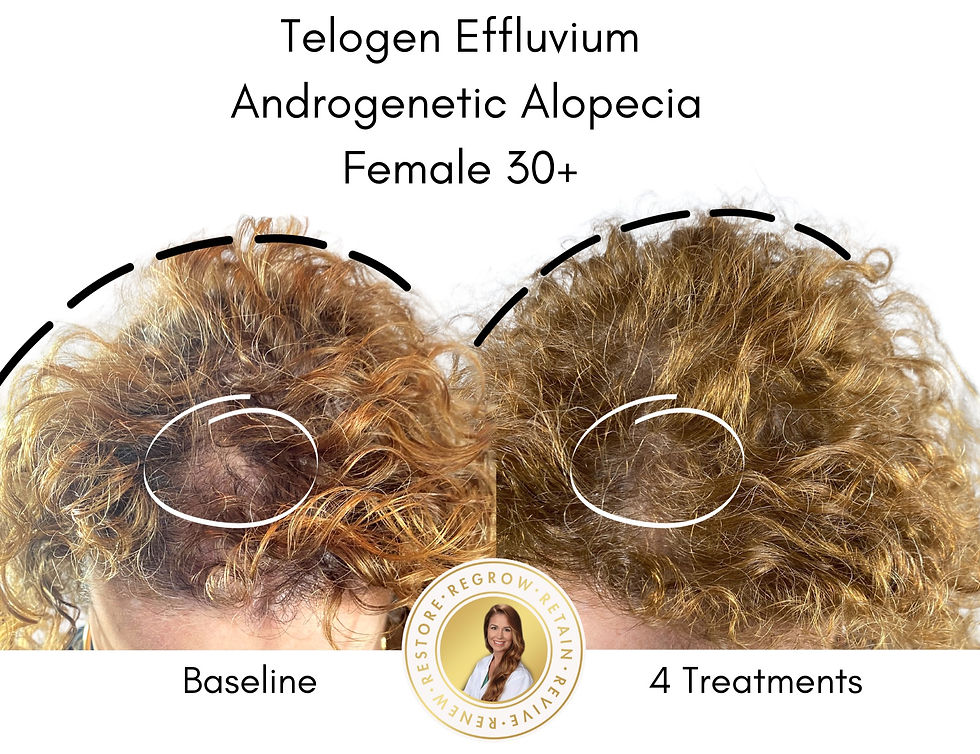Understanding Menopause and Hair Loss: Insights and Solutions from a Trichologist
- San Diego Hair Loss Specialist

- Apr 15, 2024
- 3 min read
Updated: Apr 16, 2024

I recently opened my Instagram to a flood of celebrities like Drew Barrymore speaking openly about her symptoms, menopause specialists like Dr. Mary Claire Haver being interviewed by Mel Robbins and national news channels all reporting on menopause symptoms and solutions. It is clear that the Gen X and the elder Millennial generations are not going to do menopause the same as previous generations. We now have the platform and tools to collectively shine our light on the significant challenges of menopause and we are now becoming our own advocates for the health needs women have when facing menopause. A huge part of women’s health that is often overlooked and still not talked about as often is how important hair health impacts women’s mental health. Hair is not just a vanity issue for some women.
For the last two decades I have been helping women through their hair loss journeys. As I started to experience peri-menopause symptoms myself at a much younger age than most, something clicked. I sought out as much information about menopause therapies in both traditional and holistic medicine as I could find and quickly applied this advice to my practice. As a trichologist, I often witness the distress women experience when facing hair loss during this phase of hormonal fluctuation. In this blog post, we delve into the connection between menopause and hair loss, explore statistical insights, and offer practical solutions, including Alma TED treatments, to manage this common but overlooked concern.
The Menopausal Hair Loss Conundrum:
Menopause, occurring as early as 35 in peri-menopause and typically reaching post-menopause by 55, brings about hormonal shifts that can disrupt the body's delicate balance, leading to various symptoms, including hair loss, drastic texture changes and many times extreme hair anxiety.
Statistical Insights:
Recent studies reveal that:
Prevalence: Around 60% of women experience noticeable hair thinning by menopause.
Pattern: Hair loss during menopause often manifests as diffuse thinning.
Timeline: Texture changes and miniaturization of the hair often start in peri-menopause. Hair shedding may peak around menopause but can persist for years post-menopause.
Androgenetic Alopecia: Menopausal women predisposed to this condition may experience exacerbated symptoms due to androgen influence. Treatment for Androgenetic Alopecia is ongoing and early treatment produces the best results.
Understanding the Solutions:
Managing menopausal hair loss effectively involves various strategies:
Nutrition and Supplements: A balanced diet rich in hair-essential nutrients is crucial. Supplements like biotin and omega-3 fatty acids support hair growth.
Hormone Replacement Therapy (HRT): HRT can restore hormonal balance, mitigating hair loss. Consultation with a menopause specialist is essential to find the best solution for your individual needs.
Topical Treatments: Topical serums containing peptides and antioxidants can nourish the scalp and improve hair density. You should consult a trichologist or a dermatologist who specializes in hair loss before starting any topical treatment.
Low-Level Laser Therapy (LLLT): LLLT devices in my experience are best for preventing further loss. This non-invasive treatment can be used at home or in clinical settings.
Stress Management/ Lifestyle: Stress exacerbates hair loss, so incorporating relaxation techniques like meditation is beneficial. It is easier said than done as for many women so finding your unique path is important. This is the peak season for many women who are caring for aging parents, touring colleges and maybe even still trying to expand their family. I’ll share my personal journey with this in another blog post!
Alma TED Treatments: Alma TED (Targeted Epidermal Delivery) treatments offer a cutting-edge solution. Utilizing non-invasive advanced technology, Alma TED delivers nourishing substances directly to the hair follicles, promoting rejuvenation and new growth. I am a San Diego Alma TED partner because I have seen the real results and this device has been helping clients restore hair more effectively than many leading, more invasive treatments.

Conclusion:
Menopausal hair loss requires a comprehensive approach for effective management. By understanding the mechanisms and implementing targeted solutions such as consultation with a menopause specialist to explore potential hormone therapy solutions, a good scalp care routine, nutrition/ supplements, and utilizing proven solutions like Alma TED treatments, women can navigate this phase confidently, maintaining healthy, vibrant hair. Seeking professional guidance is key to addressing individual concerns and achieving optimal outcomes. As a trichologist, I am committed to empowering women on their hair journey before, during menopause, and beyond.

Comments